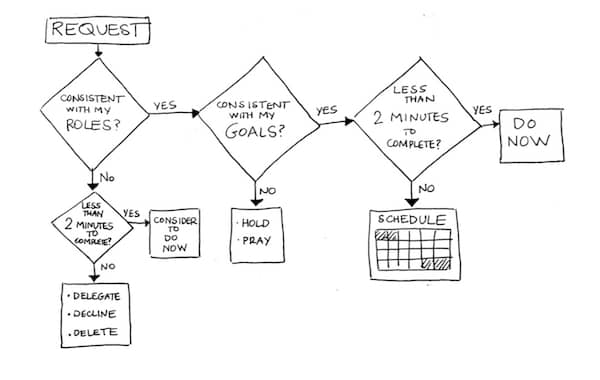How many times when someone asks you how things are going, do you say “busy?” How often do you hear others talk about their busyness and see our culture just going what seems like a million hours per hour?
A recent poll from the bureau of labor statistics said that over 60% of working Americans said they didn’t have enough time to do the things they wanted to do. Over 60%!
On top of that we see services are coming out all over the place to help us in our “busyness.” Think of Amazon’s Prime Now service….only 2 hours to get what you want. What about the increase of grocery deliveries, door dash, or even if you need something tailored….you can just have someone come directly to your house to take care of that for you.
Lastly, have you ever found yourself at the end of the day exhausted, but not even sure of what you got done? So why do we feel busy all the time?
It could be pride. Pride because we can look at our schedules, fill them the way we think they should be filled, and then say no to everything else. Pride and control can take over because we are looking at our schedules and doing what WE want to do vs what anyone else thinks we should do.
It could be laziness. While you’re busy doing many things, you know there might be more important things to focus on, but you just don’t want to. The time it would take to reflect on everything and work on your schedule and priorities seems like it’s just too much and not worth it.
It could be a legitimate busy season. We can’t control what can come into our lives and sometimes we experience seasons that are incredibly busy with a perfect storm of situations that have all come into place at the exact same time.
But the problem is, God hasn’t called us to be busy.
We weren’t created to be busy, but rather we were created to be fruitful.
The alternative to busyness is fruitfulness.
Busyness is exhausting, overwhelming, and defeating.
Fruitfulness is sustaining, enjoyable, and how we’ve been created to live.
Fruitfulness can be defined as living according to the design and purpose that God has called us to. It’s not about getting more things done, but getting the right things done.
We weren’t created to be busy, but rather we were created to be fruitful.
We all think we couldn’t add more to our schedules, and the reality is we might not be able to add more to our schedules, but we need to look at them to determine what they are pointing to. Are they pointing to busyness or are they pointing to fruitfulness?
God has entrusted us specific roles to fill, with clear priorities behind them, and that should occupy the majority of our time each week. There will always be a thousand tasks of secondary importance that tempt us to devote the wrong amount of time to them. And once you get lose in those, before you know it, you’re working on what seems like an endless to-do list of unimportant tasks.
So how do we get there? How do we become fruitful instead of just being busy?
There are 3 things to think through for time management and productivity:
1. Define My Present God-Given Roles
Where has God placed me? Where am I positioned to serve others?
When thinking about our roles, don’t think about where you are headed, think about where you currently are. Who is in your life right now, what do you currently do for work, what family members or friends or neighbors are right around you, today? We often (in our busyness) get so distracted thinking about where we are going (for jobs, relationships, etc.) that we forget about today and miss the present.
Think through those 2 questions of where God has placed you and where you are positioned to serve others and write down your top 5 roles. Here are various role examples:
Christian
Single man
Single woman
Husband
Wife
Father
Mother
Child
Church member
Pastor
Ministry leader
Employee
Business Owner
Student
Educator
Chef
Cartoonist
24-hour Emergency Plumber
Think through these roles, give it time, and write them down. You’ll need them for the next 2 things.
2. Determine Specific, Theologically Informed Goals
Let’s use Adam from the Bible as an example here when it comes to goals and knowing what we are called to do.
The Lord God took the man and put him in the garden of Eden to work it and keep it. – Genesis 2:15
So if we go off of something like that, we can formulate the following:
Adam
Role – Gardener.
Goal – To work and keep the garden.
Schedule – Filled with working, protecting, keeping the garden.
Regardless of what your role is, you can look to scripture to see what you are called to do.
Some other examples of roles with scripture are here:
Husbands
Husbands, love your wives, as Christ loved the church and gave himself up for her, 26 that he might sanctify her, having cleansed her by the washing of water with the word, 27 so that he might present the church to himself in splendor, without spot or wrinkle or any such thing, that she might be holy and without blemish. Ephesians 5:25-27
Church Member
Not neglecting to meet together, as is the habit of some, but encouraging one another, and all the more as you see the Day drawing near. Hebrews 10:25
Student
Look carefully then how you walk, not as unwise but as wise, 16 making the best use of the time, because the days are evil. Ephesians 5:15
We can see we have goals according to scripture like the husband spending time to love his wife and cleansing her with the Word. The church member remembers to keep in relationship with each other, encouraging and building one another up, and the student evaluates their time outside of classes to see if they are waking wise choices or not.
So what are your goals? Think through what your top few goals can be for each role you determined earlier.
And to help prioritize your goals, think through these things:
-Which goals honor God the most?
-Which goals are the most time sensitive?
-Which goals push you towards obedience and what God is calling you to do?
3. Transfer These Goals Into My Schedule
So now that we have determined what our God given roles are, and what our goals are associated with them, let’s now do the hard work of looking at our schedules. Evaluate your time, when and where you’re spending it, and adjust it accordingly to make sure you are spending time to achieve your goals, according to your roles.
Here is a blank calendar to download if that would help you plot out your schedule.
There’s something really important to remember when doing all of this work.
We have to remember that unexpected things will come into our lives. And if God is first in our lives, there are times He will bend our schedules and we need to adjust to Him.
On the other hand, many requests will come in and it’s a humble and Godly answer at times to tell someone “no” to the request. However, we don’t know when to say “no” if we don’t know what our clear roles and goals are each week.
Being gracious in how we say no to others instead of just being the person who is like NO all the time is crucial as well since we are representing Christ.
If we don’t know what our priorities are, the urgent will start to demand the schedule and before you know it, your scheduling is leading you vs you leading your schedule.
How Do I Evaluate Requests?
-Is it consistent with my roles?
-Is it consistent with my goals?
-Can this request be done under 2 minutes?
All of this (Roles, Goals, Scheduling) requires humility and the constant desire to remain humble and not get overwhelmed with anxiety in the process.
Humble yourselves, therefore, under the mighty hand of God so that at the proper time he may exalt you, 7 casting all your anxieties on him, because he cares for you.” – 1 Peter 5:6-7
Taking our roles and goals and time management seriously is a way we can honor The Lord. Until the most important things in our lives are placed on our schedules/calendars, we simply will not do them. If we don’t prioritize our lives, someone or something else is going to.
We structure our lives to do best what He has called us to do and stick with that in the process to build up our endurance because we are in a long marathon of a race, not a sprint. And we are in it for the glory of God and for the good of others.
At the end of the day God is the ONLY one who truly gets all of His things done. We will never truly get it perfect and have to realize there’s only so much we will accomplish each day, each week, month, year and that’s ok. It’s ok to not get “everything done” you were thinking about. It’s ok that your roles and goals get adjusted along the way. It’s ok that you won’t get this perfect because we serve a God who is perfect on our behalf.




















